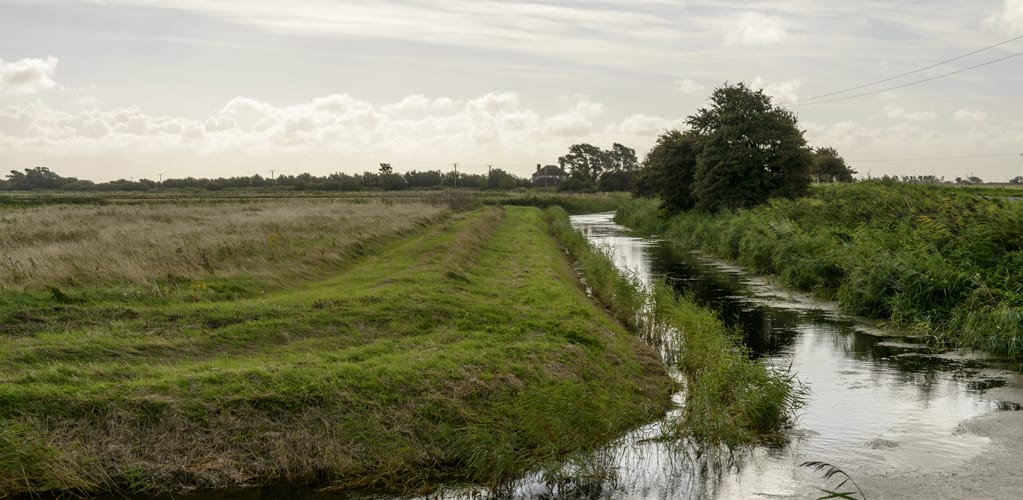
Fossil fuel advocate Nigel Farage is building a house in a high climate-risk area
Nigel Farage, a vocal climate policy critic, is building a home in a flood-prone Kent area. Despite rising sea levels threatening Romney Marsh, he continues promoting fossil fuels and climate science denial.
by SAM BRIGHT —
UK Deputy Editor at DeSmog.
Previously Investigations Editor of Byline Times
& Investigative Journalist at the BBC.
Author of Fortress London, and Bullingdon Club Britain.
Highlights from this story
● Nigel Farage is building a home in a flood-prone Kent coastal area.
● He denies climate science while supporting fossil fuel expansion and scrapping net zero.
● Reform UK receives major funding from fossil fuel interests and climate deniers.
● Experts warn climate inaction will cost trillions and worsen extreme weather globally.
R eform UK leader Nigel Farage, who has called for climate policies to be scrapped, is building a new property in an area threatened by flooding due to global warming.
Farage was given permission late last year to knock down a “tired” house in Greatstone, Kent, and replace it with a three-storey newbuild.
The house is located on the coastline, roughly 20 yards from the seafront, in the Romney Marsh area of Kent – an area of reclaimed, low-lying marshland.
The local climate change risk assessment for Kent and Medway in June 2020 stated that there is a high risk of flooding in Romney Marsh. Due to sea level rises – which are projected to reach 40 centimetres by 2050 and a metre by 2100 – some parts of Romney Marsh could be lost entirely by the end of the century.
The Met Office has echoed these findings, warning in 2018 that Romney Marsh – which is an agricultural area – will face an almost constant state of flooding by 2100.
This poses a threat to the farmers that Farage has been attempting to champion in recent months. The Reform leader has attended several farmers’ protests in Westminster following inheritance tax changes proposed by the new government, and has called for a “rural revolt” against the Labour Party.

However, Farage has advocated for policies that would exacerbate flooding in his local area. He has called for fossil fuel extraction to be ramped up, has said that the UK should scrap policies to achieve net zero emissions by 2050, and has refuted long-established climate science.
Farage stated in an interview with fellow climate science denier Jordan Peterson in July that: “I do find it extraordinary that people call carbon dioxide a pollutant, because as I understand it, plants don’t grow without carbon dioxide.”
This has been Farage’s position for some time. Speaking on GB News in August 2021, he said: “What annoys me… is this complete obsession with carbon dioxide almost to the exclusion of everything else, [and] the alarmism that comes with it.”
Authors working for the world’s foremost climate science body, the UN’s Intergovernmental Panel on Climate Change (IPCC), have said that “it is a statement of fact, we cannot be any more certain; it is unequivocal and indisputable that humans are warming the planet.”
The IPCC has also stated that carbon dioxide “is responsible for most of global warming” since the late 19th century, increasing the “severity and frequency of weather and climate extremes, like heat waves, heavy rains, and drought” – all of which “put a disproportionate burden on low-income households and thus increase poverty levels.”

“Farage is literally betting his house on the climate science denial myths he is helping to spread using his platform as an MP,” said Hannah Greer, campaigns manager at the Good Law Project. “It’s alarming that even the threat of the consequences of the climate emergency turning up on his doorstep won’t change his mind. It is all a testament to the power of disinformation and the oil and gas lobby.”
Farage’s Romney Residence
Over recent decades, the Environment Agency has been working to build and improve the flood defences in and around Romney Marsh.
In August 2024, the Environment Agency completed the Lydd Ranges Sea Defences scheme, one part of the Folkestone to Cliff End Strategy, which aims to protect the area from the effects of climate change.
“With much of Romney Marsh below high tide level, 14,500 homes, 700 businesses as well as nationally important, critical infrastructure are at risk of flooding,” the Environment Agency said, when the scheme was completed.
As of April 2021, £155 million had been spent on flood defence projects around Romney Marsh. In 2008, the Environment Agency stated that “no active intervention” to guard against climate change “would lead to failure of the defences and widespread flooding” in the area covering Farage’s new property.
Farage’s home looks out onto Greatstone dunes, which are relatively high and provide reasonable flood protection, according to the Environment Agency. However, less than a mile from the property, the beach crest is lower and there is a much greater risk of flooding.
Councillor Stephen Scoffham, the cabinet member for climate on the local Folkestone and Hythe District Council, told DeSmog that heavy rain – which is exacerbated by climate change – presents a serious flooding risk in the area.
Scoffham noted that drainage in Romney Marsh is a challenge, which was illustrated last winter when the area had a very wet period which “caused problems across the district.”
“The council takes climate change very seriously,” said Scoffham, who is a Green Party councillor. “Given the overwhelming evidence of human-induced climate change, there is an urgent need for people at all levels of society to respond accordingly. Denying that global warming is happening is neither credible nor responsible.”

— An aerial view of the English Channel and the Kent coastline, which shelters a vast expanse of low-lying land known as Romney Marsh.
Reform’s Climate Denial
In September last year, Farage headlined a fundraiser in Chicago, Illinois, for the Heartland Institute – a group that has been at the forefront of denying the scientific evidence for man-made climate change – and urged the U.S. to “drill baby drill” for more fossil fuels.
Farage – who earns over £1 million a year from his work outside Parliament – was also the “special guest of honour” at the launch of the Heartland Institute’s new European offshoot on 17 December and used his speech to claim that “net zero is the new Brexit”.
Heartland’s new UK-EU branch, based in London, will be run by Lois Perry, a climate science denier who has said it’s her “personal belief” that climate change “is happening” but “is not man-made”.
Prior to the 2024 general election campaign, Reform’s policy agenda promoted climate science denial, claiming that “climate change has happened for millions of years, before man-made CO2 emissions, and will always change”.
Reform’s election manifesto said that “net zero is crippling our economy” and that “renewables are not cheaper than fossil fuels”. Farage’s deputy Richard Tice, who was elected to Parliament in July, recently told Politico that Reform will fight the next election on scrapping the UK’s 2050 net zero emissions target.
As DeSmog revealed in June, Reform received £2.3 million from fossil fuel interests, polluters and climate deniers between the 2019 general election and the start of the 2024 campaign, amounting to 92 percent of its funding during the period.
The government’s independent spending watchdog – the Office for Budget Responsibility (OBR) – has said that, “the costs of failing to get climate change under control would be much larger than those of bringing emissions down to net zero.”
However, Reform wants to “fast track” new oil and gas licences, open shale gas fracking sites across the country, and “restart opencast coal mines using the latest cleanest techniques.”
Selwin Hart, the assistant secretary general of the UN, has warned that policies to reduce emissions are being hindered by a “prevailing narrative… pushed by the fossil fuel industry and their enablers – that climate action is too difficult; it’s too expensive.”
Rising sea levels alone could directly affect more than 1 billion people worldwide by 2050 and require up to $14 trillion worth of coastal infrastructure by 2100. Rising sea levels could cost the British economy alone more than £100 billion by the end of the century, according to research published by the journal Scientific Reports.
Farage’s own constituency of Clacton in Essex is at risk of flooding due to climate change. The Environment Agency last year upgraded Clacton’s flood defences as part of a £10 million project to protect more than 3,000 properties and businesses from “climate change and sea level rise”.

A poll in July by More in Common found that two-thirds of Clacton constituents were worried about climate change – higher than the national average.
Tice – who has claimed that CO2 “isn’t poison; it’s plant food” – also represents a constituency at high risk from the impacts of global warming. A report released in November by the insurance giant AXA found that his Boston and Skegness seat is most exposed in England to flooding, and is the second most exposed to climate change overall.
The costs of climate change have also been witnessed over the past week, as wildfires have torn through Los Angeles – destroying more than 9,000 homes and businesses, at a total cost of at least $135 billion.

GOING FURTHER
Romney Marshes - Landscape Change | NATURAL ENGLAND
Romney Marsh ‘to be constantly flooded’ according to Met Office’s UK Climate Projections report | KENT LIVE
Reform Party leader says something that even a primary school kid knows is wrong | WALES ONLINE





[Read our Comments Guidelines]